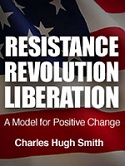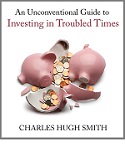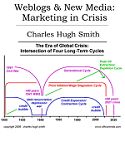

|

|
|||||||||||||
|
Why I Am Hopeful (December 25, 2012) Why am I hopeful? the Status Quo is devolving, and a better way of living lies just beyond the corrupt, wasteful, ruinous consumerist debt/financial tyranny we now inhabit. First, let's start with a Christmas song by longtime reader/contributor Dan T. who is a professional songwriter/musician: The Happy Christmas Song - thank you, Dan, for the joy of this music. Readers often ask me to post something hopeful, and I understand why: doom-and-gloom gets tiresome. Human beings need hope just as they need oxygen, and the destruction of the Status Quo via over-reach and internal contradictions doesn't leave much to be happy about. The most hopeful thing in my mind is that the Status Quo is devolving from its internal contradictions and excesses. It is a perverse, intensely destructive system with horrific incentives for predation, exploitation, fraud and complicity and few disincentives. A more human world lies just beyond the edge of the Status Quo. I know many smart, well-informed people expect the worst once the Status Quo (the Savior State and its corporatocracy partners) devolves, and there is abundant evidence of the ugliness of human nature under duress. But we should temper this Id ugliness with the stronger impulses of community and compassion. If greed and rapaciousness were the dominant forces within human nature, then the species would have either died out at its own hand or been limited to small savage populations kept in check by the predation of neighboring groups, none of which could expand much because inner conflict would limit their ability to grow. The remarkable success of humanity as a species is not simply the result of a big brain, opposable thumbs, year-round sex, innovation or even language; it is also the result of social and cultural associations that act as a "network" for storing knowledge and good will--what we call technical and social capital. I have devoted significant portions of my books Survival+, An Unconventional Guide to Investing in Troubled Times, Resistance, Revolution, Liberation: A Model for Positive Change and Why Things Are Falling Apart and What We Can Do About It to an explanation of how community and self-reliance have atrophied under the relentless expansion of the dominant Savior State and the cartel/crony-capitalist corporatocracy. The social capital and "return on investment" earned from investing time and energy in community and other social networks has been replaced by a check from the Savior State--a transfer payment that surely beats the troublesome work of investing in community in terms of risk and return. The net result of the Savior State dominating society and the economy is the rise of a pathological mindset of entitlement and resentment--the two are simply two sides of the same coin. You cannot separate them. Once self-reliance has been lost, so too has self-confidence been lost, and the Savior State dependent--individual and corporation alike--soon distrusts their ability to function in an open market. This is a truly sad, self-destructive state of affairs, and deeply, tragically ironic. The calls for "help" quickly lead to dependence on the Savior State, and that dependence quickly breeds complicity and silence in the face of repression and predation by the State and its corporate partners. In a very real sense, citizens relinquish their citizenship along with their self-reliance and self-worth once they accept dependence on the State. I often mention that the U.S. has much to learn from so-called Third World countries that are poorer in resources and credit. In many of these countries, the government is the police, the school and the infrastructure of roadways and energy. Many of these countries are systemically corrupt, and the State is the engine of enforcing that corruption. Rather than something to be embraced and lobbied, involvement with the State is something to be avoided as a risk. In everyday life, people rarely encounter the government except in law enforcement or schooling. As a result, people depend on their social capital and community for sustenance, support, work and connections. This is not altruism, it is mutually beneficial. Once a community dissolves into atomized individuals who each get a payment from the Central State, then they no longer need each other. Rather, other dependents on the State are viewed as competitors for the State's resources. These atomized, isolated individuals have a perverse relationship with the State and what remains of the community around them: lacking the self-worth earned from work or engagement/investment in a community, then their only outlet for self-identity is consumption: what they wear, eat, drink, etc. as consumers. This dependence on the State also serves the State's goal, which is a passive, compliant populace of dependents, and distracted, passive workers who pay their taxes. Thus dependence on the State and a hollow consumerism are ontologically bound: one feeds the other. The era of debt-based consumption as the engine of "growth" and "prosperity" is coming to an end. Adding debt via credit no longer creates growth; it actually takes away from the economy by expanding debt service (interest payments). The vast majority of developed-world people have had the basics of life since the late 1960s -- transport, food, shelter and utilities. The "growth" since then depended on cheap, abundant oil and a consumerist mentality in which one constantly re-defines and renews one's identity not from social investments in others or the shared community but from consumption. Not coincidentally, this dominance of consumption as the only metric for "growth" (as opposed to, say, productive activity) has been paralleled by the dominance of the Central State. The end of credit-based consumption will be a very positive development, as will the devolution of the Savior State. The Savior State is like oil--both are at their peaks and are starting their inevitable slide down the S-curve. The world they created was not as positive for human fulfillment and happiness as we have been told. Indeed, study after study has found that people with the basics for life, a higher purpose that requires sacrifice and a tight-knit community are far and away happier than isolated, atomized, insecure consumers, regardless of their wealth and consumption. This potential to re-humanize our economy is why I am hopeful. Longtime reader/correspondent Brad L. offered an insightful commentary on why he remains hopeful.
I see the potential for a discontinuous plunge into chaos driven by unsustainable debt every time I read a macroeconomic analysis. But "on the ground" in my own life, I see something different. Every day, in millions of unheralded ways, I see individuals making incremental changes in the direction of sustainability. There are twice the number of farmers' markets that there were 10 years ago, largely because the number of farmers is actually rising for the first time in modern American history. My buddy who owns an electric bike shop can't keep them in stock, because people are dumping their second cars in favor of e-bikes. There's more solar on rooftops every week in my little Tempe suburb. Etc. etc. etc. Thank you, Dan and Brad for these contributions. I will close this Christmas entry with two favorite quotes: From the poet Rumi: Where there is ruin, there is hope for treasures. From Leonardo Da Vinci (via Kathy K.): Donít underestimate this idea of mine, which calls to mind that it would not be too much of an effort to pause sometimes to look into these stains on walls, the ashes from the fire, the clouds, the mud, or other similar places. If these are well contemplated, you will find fantastic inventions that awaken the genius of the painter to new inventions, such as compositions of battles, animals, and men, as well as diverse composition of landscapes, and monstrous things, as devils and the like. These will do you well because they will awaken genius with this jumble of things.
Best wishes to you for a safe and happy holiday.
My new book Why Things Are Falling Apart and What We Can Do About It is now available in print and Kindle editions--10% to 20% discounts.
Things are falling apart--that is obvious. But why are they falling
apart? The reasons are complex and global. Our economy and society have structural
problems that cannot be solved by adding debt to debt. We are becoming poorer, not
just from financial over-reach, but from fundamental forces that are not easy to identify
or understand. We will cover the five core reasons why things are falling apart:
 1. Debt and financialization
1. Debt and financialization
2. Crony capitalism and the elimination of accountability 3. Diminishing returns 4. Centralization 5. Technological, financial and demographic changes in our economy Complex systems weakened by diminishing returns collapse under their own weight and are replaced by systems that are simpler, faster and affordable. If we cling to the old ways, our system will disintegrate. If we want sustainable prosperity rather than collapse, we must embrace a new model that is Decentralized, Adaptive, Transparent and Accountable (DATA).
We are not powerless. Not accepting responsibility and being powerless are two sides of
the same coin: once we accept responsibility, we become powerful.
To receive a 20% discount
on the print edition: $19.20 (retail $24), follow the link, open a Createspace account and enter
discount code SJRGPLAB. (This is the only way I can offer a discount.)




Please click on a book cover to read sample chapters
NOTE: gifts/contributions are acknowledged in the order received. Your name and email remain confidential and will not be given to any other individual, company or agency.
"This guy is THE leading visionary on reality.
He routinely discusses things which no one else has talked about, yet,
turn out to be quite relevant months later."
Or send him coins, stamps or quatloos via mail--please request P.O. Box address. Subscribers ($5/mo) and contributors of $50 or more this year will receive a weekly email of exclusive (though not necessarily coherent) musings and amusings. At readers' request, there is also a $10/month option. What subscribers are saying about the Musings (Musings samples here): The "unsubscribe" link is for when you find the usual drivel here insufferable.
All content, HTML coding, format design, design elements and images copyright © 2012 Charles Hugh Smith, All rights reserved in all media, unless otherwise credited or noted. I am honored if you link to this essay, or print a copy for your own use.
Terms of Service:
|
Add oftwominds.com |